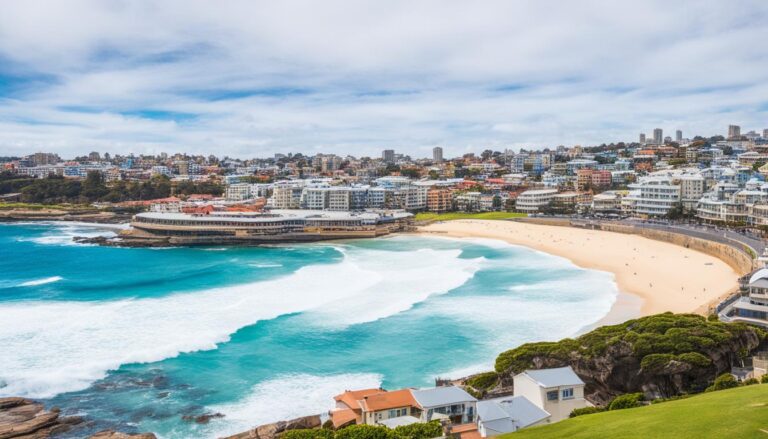The Current Status of Airbnb in Bondi Beach: A Detailed Overview
Bondi Beach, located in Sydney, Australia, is a popular tourist destination known for its stunning scenery and robust vacation rental market. However, there has been much speculation recently regarding the status of Airbnb and similar short-term rental platforms in Bondi Beach. In this comprehensive article, we will delve into the current situation to provide you with a clear understanding of whether Airbnb has been banned in Bondi Beach or not.
Key Takeaways:
- Airbnb has not been completely banned in Bondi Beach.
- The regulatory framework surrounding short-term rentals is complex and evolving.
- Hosts and renters should familiarize themselves with the Code of Conduct for the Short-term Rental Accommodation Industry in NSW.
- Compliance with the Code of Conduct is essential to ensure a smooth and legal operation in Bondi Beach or any other location.
Background of Short-Term Rentals in Bondi Beach
In recent years, the rise of platforms like Airbnb has transformed the way people travel, offering affordable and flexible accommodation options. However, this has also raised concerns among local communities and policymakers, leading to debates and regulatory interventions in various cities worldwide, including Bondi Beach.
Bondi Beach, a world-famous tourist destination, has seen a surge in demand for vacation rentals in recent years. With its stunning coastline and vibrant local community, it comes as no surprise that Bondi Beach has become a hotspot for vacation rental platforms like Airbnb.
This surge in demand for short-term rentals has led to concerns about the impact on the local community, including increased noise, waste, and security risks. Therefore, the local government has implemented regulations to ensure that these issues are addressed while still allowing the short-term rental market to operate.
| Bondi Beach Vacation Rentals | Bondi Beach Accommodation Regulations | Airbnb Policy Bondi Beach |
|---|---|---|
| Bondi Beach offers a wide range of vacation rentals, from luxurious beachfront properties to cozy apartments in the heart of the community. | The local government has implemented regulations to ensure that short-term rentals in Bondi Beach comply with certain standards, including waste management, noise control, and guest behavior. | Airbnb, like other vacation rental platforms, must comply with the local regulations governing short-term rentals in Bondi Beach. Hosts and renters using Airbnb must also adhere to these regulations. |
The Regulatory Framework:
To assess the current status of Airbnb in Bondi Beach, it is important to understand the local regulatory framework. At present, the regulation of short-term rentals in Australia primarily falls under the jurisdiction of individual state governments. Therefore, the rules and regulations governing Airbnb in Bondi Beach may differ from other regions.
State of New South Wales:
Bondi Beach is situated within the state of New South Wales (NSW), and its regulatory framework plays a crucial role in determining the status of Airbnb in the area. In December 2020, the NSW government introduced new legislation aiming to strike a balance between the rising popularity of short-term rentals and the concerns raised by local communities.
The Fair Trading Act 1987 and the new Code of Conduct:
Under the Fair Trading Act 1987, the NSW government has implemented the Code of Conduct for the Short-term Rental Accommodation Industry. This Code of Conduct sets out certain obligations for property owners looking to offer short-term rentals, including hosting platforms like Airbnb.
Impact on Bondi Beach:
The implementation of the Code of Conduct has had a significant impact on Airbnb and other rental platforms operating in Bondi Beach. Some of the key provisions include:
| 1. Registration: | Hosts are required to register their property as a short-term rental with the state government and obtain appropriate insurance coverage. |
|---|---|
| 2. Guest Behavior: | Hosts must ensure that their guests comply with a defined set of standards, including rules related to noise, waste management, and respecting the local community. |
| 3. Complaints Handling: | Hosts are expected to address any complaints or concerns raised by neighbors or local authorities promptly and responsibly. |
| 4. Host Responsibility: | It is the responsibility of hosts to provide accurate information about their property, maintain it in a safe and well-maintained condition, and ensure compliance with relevant laws and regulations. |
| 5. Strata Schemes: | If a property belongs to a strata scheme, hosts must obtain necessary approvals from the owners’ corporation to operate short-term rentals. |
| 6. Penalties and Fines: | Failure to comply with the Code of Conduct may result in penalties and fines imposed by the NSW government. |
In Conclusion:
In conclusion, while there have been concerns and debates surrounding short-term rentals, particularly in popular tourist destinations like Bondi Beach, Airbnb has not been completely banned in the area. However, the introduction of the Code of Conduct in December 2020 has brought significant changes, imposing stricter regulations on property owners and rental platforms.
If you are considering hosting or renting on platforms like Airbnb in Bondi Beach, it is crucial to familiarize yourself with the Code of Conduct and ensure compliance with the obligations outlined. Keeping yourself well-informed about the evolving regulatory landscape will help you navigate the short-term rental market responsibly and contribute positively to the local community.
However, it is essential to note that the regulatory framework surrounding Airbnb and short-term rentals may evolve over time. Therefore, it is always advisable to stay updated with the latest regulations and guidelines provided by the relevant authorities to ensure a smooth and legal operation in Bondi Beach or any other location.
The Current Status of Airbnb in Bondi Beach: A Detailed Overview
Bondi Beach is situated within the state of New South Wales (NSW), and its regulatory framework plays a crucial role in determining the status of Airbnb in the area. In recent years, the rise of platforms like Airbnb has transformed the way people travel, offering affordable and flexible accommodation options. However, this has also raised concerns among local communities and policymakers, leading to debates and regulatory interventions in various cities worldwide, including Bondi Beach.
The State of New South Wales and Airbnb Regulations
At present, the regulation of short-term rentals in Australia primarily falls under the jurisdiction of individual state governments. Therefore, the rules and regulations governing Airbnb in Bondi Beach may differ from other regions. Bondi Beach is situated within the state of New South Wales (NSW), and its regulatory framework plays a crucial role in determining the status of Airbnb in the area.
In December 2020, the NSW government introduced new legislation aimed at striking a balance between the rising popularity of short-term rentals and the concerns raised by local communities. Under the Fair Trading Act 1987, the NSW government has implemented the Code of Conduct for the Short-term Rental Accommodation Industry. This Code of Conduct sets out certain obligations for property owners looking to offer short-term rentals, including hosting platforms like Airbnb.
The Fair Trading Act 1987 and the Code of Conduct
The Code of Conduct for the Short-term Rental Accommodation Industry sets out certain obligations for property owners and hosting platforms like Airbnb. Some of the key provisions include:
- Registration: Hosts are required to register their property as a short-term rental with the state government and obtain appropriate insurance coverage.
- Guest Behavior: Hosts must ensure that their guests comply with a defined set of standards, including rules related to noise, waste management, and respecting the local community.
- Complaints Handling: Hosts are expected to address any complaints or concerns raised by neighbors or local authorities promptly and responsibly.
- Host Responsibility: It is the responsibility of hosts to provide accurate information about their property, maintain it in a safe and well-maintained condition, and ensure compliance with relevant laws and regulations.
- Strata Schemes: If a property belongs to a strata scheme, hosts must obtain necessary approvals from the owners’ corporation to operate short-term rentals.
- Penalties and Fines: Failure to comply with the Code of Conduct may result in penalties and fines imposed by the NSW government.
Impact of Regulations on Airbnb in Bondi Beach
The implementation of the Code of Conduct has had a significant impact on Airbnb and other rental platforms operating in Bondi Beach. Hosts are now required to comply with a stricter set of regulations, including registration and insurance requirements, guest behavior standards, and complaints handling obligations. Failure to comply with the Code of Conduct may result in penalties and fines imposed by the NSW government. Hosts and renters considering using Airbnb in Bondi Beach must familiarize themselves with the Code of Conduct and ensure compliance with the obligations outlined to operate legally and responsibly.
Understanding the Regulatory Framework in Bondi Beach
In recent times, the rise of short-term rentals, including Airbnb, has raised concerns among local communities and policymakers in various cities worldwide, including Bondi Beach. To assess the current status of Airbnb in Bondi Beach, it is important to understand the local regulatory framework. At present, the regulation of short-term rentals in Australia primarily falls under the jurisdiction of individual state governments. Therefore, the rules and regulations governing Airbnb in Bondi Beach may differ from other regions.
The State of New South Wales and Airbnb Regulations
Bondi Beach is situated within the state of New South Wales (NSW), and its regulatory framework plays a crucial role in determining the status of Airbnb in the area. Under the Fair Trading Act 1987, the NSW government has implemented the Code of Conduct for the Short-term Rental Accommodation Industry, which sets out certain obligations for property owners and hosting platforms like Airbnb.
The Fair Trading Act 1987 and the new Code of Conduct:
The Code of Conduct for the Short-term Rental Accommodation Industry in NSW aims to strike a balance between the rising popularity of short-term rentals and the concerns raised by local communities. The Code sets out certain obligations for property owners offering short-term rentals, including hosts on platforms like Airbnb.
Impact of Regulations on Airbnb in Bondi Beach
The implementation of the Code of Conduct has had a significant impact on Airbnb and other rental platforms operating in Bondi Beach. Some of the key provisions include registration, guest behavior, complaints handling, host responsibility, strata schemes, and penalties and fines for non-compliance. It is the responsibility of hosts to comply with these provisions and ensure a safe and respectful short-term rental experience for guests and the local community.
Conclusion
In conclusion, while there have been concerns and debates surrounding short-term rentals in Bondi Beach, Airbnb has not been completely banned in the area. However, hosts and rental platforms must comply with the Code of Conduct for the Short-term Rental Accommodation Industry introduced by the NSW government in December 2020. Familiarizing yourself with the Code of Conduct and staying updated with the latest regulations and guidelines will help you navigate the short-term rental market responsibly and contribute positively to the local community.
The Impact of Regulations on Airbnb in Bondi Beach
The implementation of the Code of Conduct has had a significant impact on Airbnb and other short-term rental platforms operating in Bondi Beach. These regulations have brought in stricter rules for property owners and rental platforms, imposing a range of obligations to provide a safe and comfortable experience for guests while ensuring the local community’s welfare. Some of the most notable impacts are:
- Registration: Hosts are required to register their properties with the state government as short-term rentals and obtain the necessary insurance coverage. This registration process is essential to ensure that all properties meet the state government’s safety and quality standards.
- Guest Behavior: Hosts must ensure that their guests comply with a defined set of standards, including rules related to noise, waste management, and respecting the local community. These standards help maintain peace and tranquility within the neighborhood and ensure a pleasant experience for all.
- Complaints Handling: Hosts are expected to address any complaints or concerns raised by neighbors or local authorities promptly and responsibly. This approach helps resolve issues before they escalate and maintain a positive relationship with the community.
- Host Responsibility: It is the responsibility of hosts to provide accurate information about their properties, maintain them in a safe and well-maintained condition, and ensure compliance with relevant laws and regulations. This responsibility helps ensure that guests have a comfortable and safe stay and that the local community is not unduly affected.
- Strata Schemes:If a property belongs to a strata scheme, hosts must obtain necessary approvals from the owners’ corporation to operate short-term rentals. This requirement helps ensure that all members of the strata scheme understand and agree to the use of the property for short-term rentals.
- Penalties and Fines: Failure to comply with the Code of Conduct may result in penalties and fines imposed by the NSW government. These penalties and fines can be substantial and can range from warnings to hefty fines, depending on the severity of the offense.
The Bottom Line
The Code of Conduct for the Short-term Rental Accommodation Industry has impacted the Airbnb market in Bondi Beach significantly. Property owners and rental platforms are required to comply with strict rules and regulations, and non-compliance can result in substantial penalties or fines. As a host or guest, it is crucial to familiarize yourself with the Code of Conduct and ensure compliance to have a safe and comfortable stay in Bondi Beach.
Conclusion
In conclusion, while there have been concerns and debates surrounding short-term rentals, particularly in popular tourist destinations like Bondi Beach, Airbnb has not been completely banned in the area. However, the introduction of the Code of Conduct in December 2020 has brought significant changes, imposing stricter regulations on property owners and rental platforms.
If you are considering hosting or renting on platforms like Airbnb in Bondi Beach, it is crucial to familiarize yourself with the Code of Conduct and ensure compliance with the obligations outlined. Keeping yourself well-informed about the evolving regulatory landscape will help you navigate the short-term rental market responsibly and contribute positively to the local community.
However, it is essential to note that the regulatory framework surrounding Airbnb and short-term rentals may evolve over time. Therefore, it is always advisable to stay updated with the latest regulations and guidelines provided by the relevant authorities to ensure a smooth and legal operation in Bondi Beach or any other location.
FAQ
Q: Has Airbnb been banned in Bondi Beach?
A: No, Airbnb has not been completely banned in Bondi Beach. However, there are regulations and a Code of Conduct that property owners and rental platforms, including Airbnb, must adhere to.
Q: What are the regulations for short-term rentals in Bondi Beach?
A: The regulations for short-term rentals in Bondi Beach are governed by the Fair Trading Act 1987 and the Code of Conduct for the Short-term Rental Accommodation Industry implemented by the NSW government.
Q: What obligations do property owners have when offering short-term rentals in Bondi Beach?
A: Property owners must register their property as a short-term rental, obtain appropriate insurance coverage, ensure their guests comply with standards, address complaints promptly, provide accurate information about their property, maintain it in a safe condition, and comply with relevant laws and regulations.
Q: Are there penalties for non-compliance with the Code of Conduct?
A: Yes, failure to comply with the Code of Conduct may result in penalties and fines imposed by the NSW government.
Q: How can hosts and renters stay updated with the changing regulations in Bondi Beach?
A: It is advisable to stay updated with the latest regulations and guidelines provided by the relevant authorities in Bondi Beach to ensure a smooth and legal operation.







